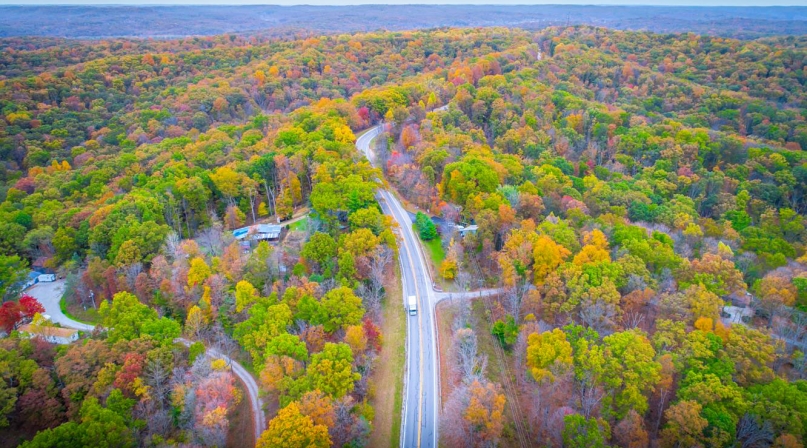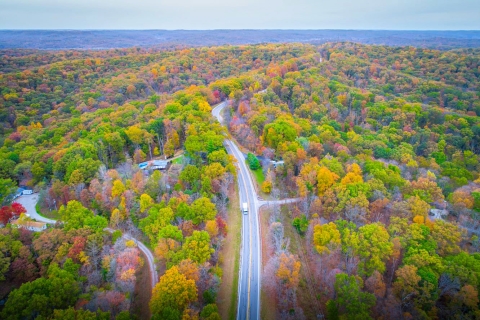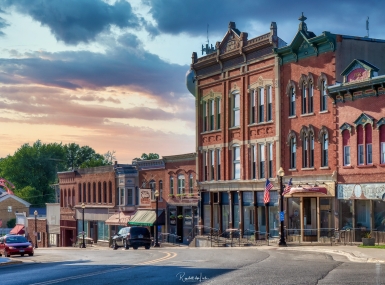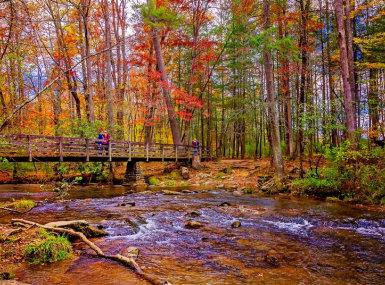County ‘leaf-cam’ attracts tourism dollars
Author
Upcoming Events
Related News

Key Takeaways
As some regions are winding down after a busy summer season, things are just gearing up for a rural county in Indiana.
“It gets pretty nutty around here in the fall,” said Aubrey Sitzman, the public relations coordinator for the Brown County Convention and Visitors Bureau.
In Brown County, Ind., tourism is the second largest industry and is the biggest employer, right behind government jobs. In 2017, Brown County visitors spent nearly $43 million in the county. Sitzman estimates around three million people visit the county per year, with one million visiting in October during the fall.
The county’s landscape has always been a draw, dating back to the early 1900s, when the county attracted artists who traveled there to paint its hills, forests and other landscapes.
See more
“From there, it turned into a tourist town,” Sitzman said.
The majority of Brown County is public land and includes the Brown County State Park, the Yellowwood State Forest, the Hoosier National Forest and nature preserves. As the most densely forested county in all of Indiana, outdoor activities are popular with one seasonal attraction rising above the others: Viewing the fall foliage.
“I think people have this view that Brown County is a place where they can get away in the fall time, have peace and quiet, watch the changing leaf colors and have a nice spot to huddle around a campfire and just enjoy nature,” said Mark Shields, director of the Brown County Department of Parks and Recreation.
During the fall, leaves from the county’s Sassafras, Maple and Oak trees all produce a variety of colors, he noted. Given the county’s geographical location, Maple trees are common in the area.
“It’s like a tradition that when it turns fall and the leaves start changing, everyone loves to come to Brown County because it’s way brighter leaves,” Sitzman said.
From the county perspective, visitors who come during the fall season help the local economy by booking hotels, to the point where there are no available rooms, and providing local shops with more business, Sitzman said. She added that restaurants and retail shops do 30 to 40 percent of their business for the whole year in the fall, specifically in October.
“The whole county can benefit because the more people you have to come or even the more residents come and spend at your local businesses, the more money goes back into the county,” she said.
Throughout the years, the Brown County Convention and Visitors Bureau has used a leaf camera to provide a live look at leaves in different areas of the county. The cameras are posted online so visitors can plan a visit when the leaves will be at their peak, Sitzman said. The main “leaf cam” is perched atop a cabin and updates every 15 minutes.
“A lot of people want to come when they’re going to be at their absolute brightest so they can kind of keep tabs on where they’re at in the process of changing by looking at that leaf cam,” she said.
According to the U.S. Forest Service, the colors of leaves are influenced by leaf pigments, the length of night and the weather. The color usually begins to change when nights become longer. In Brown County, leaves typically peak around the third or fourth week of October. This year, with warmer weather, Sitzman said she expects the leaves to peak later than usual.
“We don’t really mind that because it extends our busiest tourism season on into November,” she said.
Shields explained the Department of Parks and Recreation holds other community events for local residents including a “Fall-O-Ween” kickoff event for the season, hayrides, bonfires, showings of Halloween-themed movies, haunted trails, Trick-or-Treat on the Trail and an annual Cabin Fever 5K. Additionally, the county has a walkable downtown village with around 200 shops and restaurants that are always decorated for the fall season.
“Beyond the leaves and the outdoor aspect, I think people like to come because it’s an exciting place to be,” Stitzman said. “It has a fun fall vibe that people enjoy and to a lot of people, it’s just a tradition for them.”
Other counties across the country see colorful displays of leaves specifically near the New England, the Adirondack, Appalachian, Smoky and Rocky Mountains. The eastern part of the country typically sees more reds, oranges, golds and bronze colors in leaves while the west sees bright yellows, according to the U.S. Forest Service.
SmokyMountains.com features a 2019 Fall Foliage Prediction Map. The tool forecasts county-by-county when peak color will occur from the beginning of September to the end of November using data points from the National Oceanic and Atmospheric Administration and historical leaf trends.
“The predictive fall leaf map helps potential travelers, photographers and leaf peepers determine the precise future date that the leaves will peak in each area of the continental United States,” said Wes Melton, SmokyMountains.com data scientist and Chief Technology Officer.
Although it is impossible to ensure 100 percent accuracy, the tool helps those who are traveling determine the weeks that leaves will peak.
“I definitely think if you do have fun fall activities or you do have pretty fall scenery, it’s a great thing you can really capitalize and promote and make it a draw for people to come to your destination,” Sitzman said.
And for Brown County’s busiest time of year…
“There’s just a lot of open space that people can come and enjoy,” Shields said.

Attachments
Related News

Counties and Railroads: Shared Priorities for the Next Surface Transportation Bill
County leaders from across the country have a vital opportunity to ensure their infrastructure priorities are front and center.

House reintroduces bipartisan legislation to level playing field for rural communities
House reintroduced the Rural Partnership and Prosperity Act, bipartisan legislation intended to advance economic development in rural counties and overcome barriers to obtaining federal funding and resources.

Podcast: Eastern Tennessee counties invest in tourism during shutdown
Sevier County, Tenn. refused to let the government shutdown devastate its fall tourism draw—Great Smoky Mountains National Park. County Mayor Larry Waters describes the lengths he and his neighbors went to keep the park open. And NACo Chief Government Affairs Officer Mark Ritacco offers an outlook on what counties can take away from the shutdown and into the future.
